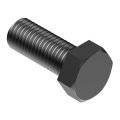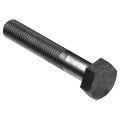Hex Bolts
Premium Hex Bolts for Industrial Fastening
Hex bolts, characterized by their six-sided head, are one of the most common and versatile fasteners used in construction and manufacturing. These bolts are designed to provide strong, secure connections in a variety of materials including wood, steel, and other metals. Their hexagonal head also allows for easy tightening and removal with standard wrenches or sockets, making them a practical choice for maintenance and assembly operations. Hex head and structural bolts are available in either full or partially threaded options to accommodate different connection needs.
Hex bolts serve a critical function in various applications by providing a secure fastening solution that can be easily assembled and disassembled. Huyett’s selection of hex head bolts and structural heavy hex bolts each offer unique benefits based on their design. Standard hex head bolts offer a standard connection option, while structural hex bolts are well suited for heavier duty holds and provide the spec/grade on the enlarged head. Flange hex bolts offer either a smooth or serrated surface under the flanged head to provide different grips, and cap hex bolts (also known as hex cap screws) feature a washer face bearing surface under the head and chamfered ends.
- High Tensile Strength: Hex bolts are engineered to withstand rigorous industrial demands.
- Versatility: They are suitable for a wide range of applications, from construction to automotive.
- Corrosion Resistant and Durable: Huyett’s selection of hex bolts is available in a wide range of strong materials, including multiple grades of steel and stainless steel (with DIN, SAE, ASTM, and ISO standard options). There are a variety of finishes available, including zinc, hot-dipped galvanized, and others, that offer high corrosion resistance.
- Related Products: Shop Huyett’s full selection of bolts, including carriage bolts, timber bolts, tension control bolts, and more.
What Are the Important Measurements to Take for A Hex Bolt?
To accurately determine the size of a hex bolt, it is important to measure the diameter, length, and thread size of the shank. If the thread size is imperial, you will look for the TPI (threads per inch), which is a count of how many threads are in 1 inch of the threaded shank. If the bolt is metric, you will measure the thread pitch; this is the distance (measured in millimeters) between two thread crests.



